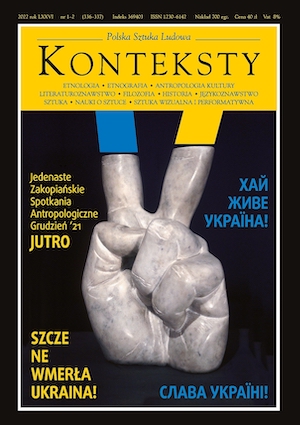Jutro będzie wolne. Subiektywne doświadczenia czasu w życiu codziennym, w literaturze i filmie
Tomorrow Will Be Free. Subjective Experiences of Time in Daily Life, Literature, and Film
Author(s): Anna SobolewskaSubject(s): Philosophy, Social Sciences, Essay|Book Review |Scientific Life
Published by: Instytut Sztuki Polskiej Akademii Nauk
Keywords: future;anthropology
Summary/Abstract: The author follows the illusions and myths of a better, free tomorrow. The protagonists of past and contemporary works hoped for a tomorrow that was to be a fulfilment of their life plans and ambitions (cf. novels and tales by Henry James and Jo Nesbø). Within the domain of daily life various activities – practical and symbolic, such as hoarding, the process of collecting clothes or memorabilia – could become a strategy aimed at halting the destructive force of time and safeguarding tomorrow, as well as taming the fear of death. Similar purposes can be served by travelling and moving / relocation (cf. statements made by Roma Ligocka and Anna Janko). Paradoxes of the perception of time are also the theme of Nie ma czasu – a poem by Rev. Jan Twardowski. The presented analysis focuses on two novels by Henry James: The Beast in the Jungle and The Altar of the Dead, whose protagonists represent two different types of mania associated with experiencing time. The lead character of The Beast in the Jungle lives thanks to a vision of a triumphant future and the exceptional nature of his fate. On the other hand, the protagonists of The Altar of the Dead and François Truffaut’s film: The Green Room / La Chambre verte (a free adaptation of this particular novel by James) are obsessed with the past, bordering on the cult of death. The reader accompanies James’ and Truffaut’s protagonists in the difficult process of self-cognition. The Truffaut films may be also treated as autothematic works in which time is the hidden main character (cf. theses by Gilles Deleuze). The narration of Agnès Varda’s Cléo from 5 to 7 / Cléo de 5 à 7 is an example of the game played by mechanical and subjective time dominated by fear of death. In The Green Ray / Le Rayon vert, a film by Eric Rohmer, the processes of a subjective experiencing of time and deciphering signs become a path towards emancipation. The Varda and Rohmer films compel the spectators to confront the mystery of destiny. In Begegnung mit Krzysztof Kieslowski, a documentary by Lothar Kompatzki (an analysis of the symbolic plot in Krótki film o zabijaniu / A Short Film about Killing and Trzy kolory: Czerwony / Three Colours: Red) Krzysztof Kieślowski presented a model of human plight within the domain of the art of filmmaking as a game played by destiny, chance, and free will. A symbolic plot connected with the categories of time and timelessness constitutes the axis of Poste restante, a documentary by Marcel Łoziński about the fate of undelivered letters. An analogy of filmmaking and Buddhist thought proclaiming the co-dependence of material existence and emptiness. The works of Miron Białoszewski as an example of poetic contemplation and expeditions beyond the categories of time and space.
Journal: Konteksty
- Issue Year: 336/2022
- Issue No: 1-2
- Page Range: 157-164
- Page Count: 9
- Language: Polish

